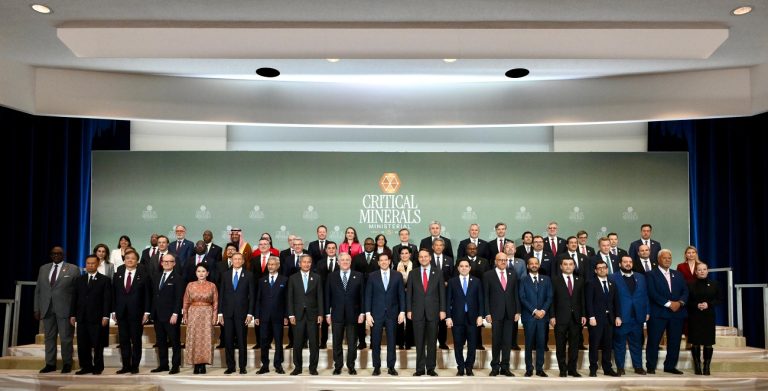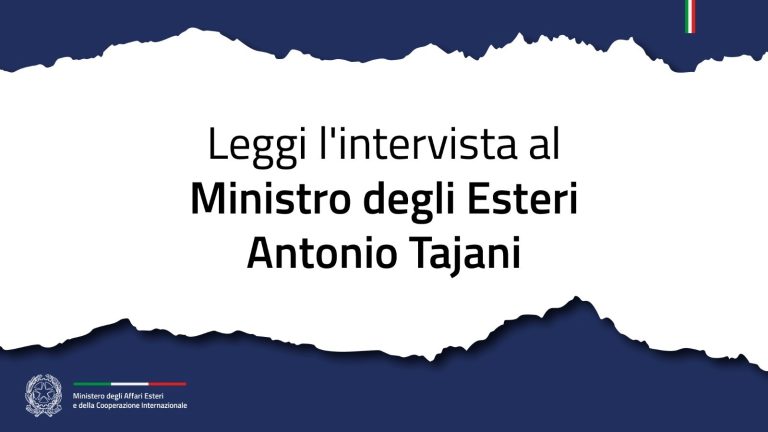Minister Tajani, you are responsible for foreign policy but also for “foreign trade”: President Trump’s letter on tariffs to Europe is a nasty surprise. How do you comment on it and how will you react?
Such an intervention from President Trump was expected, and I see it as a step in his negotiating tactics. The negotiation is not over, and in the next few hours, President von der Leyen, Commissioner Sefcovic, and all our technical experts will be working to decide the next steps. In the meantime, as you may know, all possible options have already been considered. We do not want a clash with the United States, but we want to defend our companies, our industry, and our workers. We need to negotiate with our heads held high. This phase of uncertainty must end. Our companies need certainty; they need to operate in the United States within a clear framework. As my EPP colleagues in the European Parliament said, “negotiate if possible, react if necessary.” I am always optimistic, but we can only defend European industry.
At the Ukraine Recovery Conference held in Rome, there seemed to be again more harmony with the United States: are there risks that the climate will change due to the decisions on tariffs?
General Kellogg, with whom I had a bilateral meeting, was beside me in the donors’ meeting and then attended the Conference and the “coalition of the willing” meeting. The United States, which never left, is now coming back more strongly. For the first time President Trump indicated there will be new military aid, particularly anti-aircraft batteries, but economic and humanitarian assistance has never stopped, especially assistance to support Ukraine’s energy resilience. Despite the rhetoric, the United States and Europe continue to work together, and this also applies to reconstruction.
At the Rome Conference Italy’s financial commitments were $10 billion, but could the total amount rise further? The World Bank estimates the damage to date at $500 billion.
The Ukrainian government described the Conference as “the most productive ever”: $10 billion public funds were allocated for the reconstruction of Ukraine. An important basis that, with leverage, is bound to grow, producing a much greater investment potential. This shows that the level of support for Ukraine and for the effort being made by this courageous country is rekindling. In Rome, there were 8,000 participants, dozens of Heads of Government and Ministers. The decision to support Kyiv is not only the right one, but remains widely supported by our governments and public. The contracts signed by companies in Rome are worth approximately $5 billion: these are figures that are destined to grow, especially if we succeed in achieving the goal of a just, lasting, and sustainable peace and getting reconstruction started in the areas that need it most.
Another novelty is the creation of a new instrument, a European investment fund: could this be the way forward for future interventions?
This is indeed a significant development. When Blackrock withdrew at the beginning of the year, we did not let ourselves be scared and began working with the French, German, and Polish governments and their respective development banks—CDP for Italy—to create an equity fund that could address the lack of private capital to invest in Ukraine. We did that together with the European Commission, through the guarantees provided by the facility set up in Brussels to support Ukraine. Here too, the potential for development in terms of mobilized investment is significant, reaching up to €2 billion. But I reiterate that the amount of funding is not the only measure of success: it is the very strong political support of those who do not want to abandon Ukraine and are actually redoubling their efforts.
So are you saying that the allocations coming from State budgets will inevitably pull in private funding when the right time comes?
To rebuild Ukraine – a strategic project worth €500 billion according to the World Bank – public funds are not enough. We need to mobilize private investment. The most important aspect is the end of the conflict. At the same time, we must be prepared and set up the most suitable financial and insurance instruments to intervene quickly. I therefore wanted to mobilize CDP, SACE, and SIMEST, each of which, with its own tools, can play an important role. CDP, which manages the revolving fund of our Development Cooperation, is the operational arm of our financial interventions. SACE is ready to intervene to support strategic projects for Ukraine up to €1.5 billion. SIMEST has established a €300 million reserve from Fund 394 of the Ministry of Foreign Affairs to support the competitiveness of Italian companies involved in the reconstruction of Ukraine. I have signed an agreement with the Ukrainian government that brings together these three instruments to create a strategic package of subsidized finance.
Hundreds of companies were present in Rome, many of which had signed agreements with Ukrainian entities, over 200. How is the dialogue with the industrial world and with the associations representing them?
In Rome, the best of European industry and companies took to the field in Rome, with Italians at the forefront. In Rome, I saw a real “civil army” deployed that will contribute greatly to Ukraine’s victory: the industries and finance sectors are already working on the reconstruction and strengthening of the country, while the war is still going on. I visited the stands of Italian and Ukrainian companies, which showed nothing but a desire to get to work as quickly as possible. Italy’s Confindustria has been given the crucial task of coordinating the Business Advisory Council, with Vice President Barbara Cimmino taking charge. This is not just a “technical” role: it is a very high-level “political” role, on which Confindustria will work with the full support of the Italian government, to support the country today in its defence and tomorrow in its reconstruction. German Chancellor Merz’s words of congratulations to Confindustria and his encouragement are shared by the Italian government.
It will also require the involvement of Italian banks, some of which have particular experience in Eastern Europe: are they ready to invest in projects in Ukraine?
The role of banks and insurance companies, at least at this stage, is crucial. Suitable financial instruments are required, and we need to equip ourselves to reduce the risks inherent in operating in a war situation. We also need banks to support the Ukrainian government’s planning efforts, so that “bankable” projects can be submitted according to a clear line of priorities. Ukraine is an economy characterized by thousands of small and medium-sized enterprises, which will also work with small Italian and European companies. Banks need to work across supply chains to bring these companies to participate in large reconstruction projects, which they could not access on their own. All the major financial players in Italy were present at the Rome Conference, some of which played an active role in the discussions, and we are counting on their increasing involvement in the reconstruction process.
The reconstruction and reindustrialization projects can potentially also affect the master plan on armaments, given NATO decisions and Germany’s focus on this aspect.
One of the main innovations of this Conference was the introduction of the “strategic industry and defence” dimension, which was not present in Berlin. Ukraine has become an extraordinary player in this area, and investing in the country not only strengthens Ukrainian defence but also that of European countries in a logic of progressive integration. This is the reason why the main defence conglomerates and our national companies were present in Rome, and a series of agreements were signed by AIAD. Fincantieri presented its project to secure the port of Odessa, which is strategic for both commercial traffic and submarine cables. This is a project at which we are looking very carefully, as Italy is committed to supporting the recovery and reconstruction of the city and region of Odessa, to which we are linked for historical reasons, starting with its cultural heritage. Here too, the Commission and the European Investment Bank can play a fundamental role.



